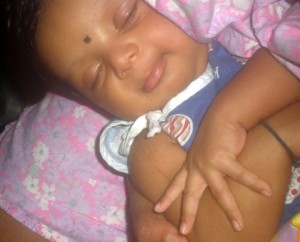For the past two months, there is this one question that am constantly dogged me as friends, colleagues and even strangers keeping jabbing the same at me ever since I became a father. Any conversation these days starts with the cursory exchange of pleasantries, the talk of the birds, the bees, the recession and so on till the query is lobbed at me like a stun grenade, “Ohh..Leave all that. So how does it feel to be a father?”
Stumped, is how I feel. Believe you me, it is not everyday that I am at loss of words or unable to articulate my thoughts; but as much as I have thought over the issue, I am still hard pressed to give a honest, coherent and simple answer to the same.

- Tutul in Lala Land!!
Looking into the person’s eye asking me the question, I feel the burden of expectation on me. The person, apparently, wants me to break into raptures using esoteric terms and inane adjectives like ‘heavenly’, ‘wondrous’, ‘out of this world’, etc. to describe the whole gamut of emotions. And yet, there I stand trying to figure out what exactly to say, and then finally after some 30 seconds of awkward silence, I do oblige, and mumble something like, “On top of the world, the greatest I have felt, etc. etc.”
Profundity is the issue out here, being a father is not like winning a race or netting a babe, which evoke a single-dimensional happiness based on a sense of achievement. There are so many emotions that sweep over you in a matter of minutes and days, that it is impossible not to get numb. In fact, right after Idhant’s birth I was beset by numbness and really did not know what to feel. In fact, every time I saw the little guy, it was hard to believe that this fragile, delicate, pinkish tiny tot possessed 23 of my chromosomes in his DNA. Right from the hospital to the in-laws place and finally to mine, there were just so many thoughts running through my mind that it was hard for me to pick one out, package it with words and then dish it out as what I was feeling.
Even now, when I sit back and reflect on the days gone by and the ones that lie ahead, I feel flustered, thankful, happy, concerned, confident, worried, proud, scared, superstitious, etc. all at the same time. Hence, whenever someone poses the “how does it feel to be a father” query at me, I honestly wish I could make him/her understand how the feeling is.

Jai ho!! (even in sleep)
My Eureka! moment happened some days back, when a method popped up in my head. The answer lay with Socrates. Using Socratian counter-argumentative approach, I have structured a brief “How does it feel” questionnaire, that needs to be answered by the curious subject. Once that is candidly done, the subject needs to now amalgamate all the different views and that should more or less correlate to my own feelings. So, in case you want to know how it feels, why don’t you simply answer the following ‘How does it feel’ quiz below:
I) How does it feel – to suddenly realize that you are merely a penny-earner who can’t really afford anything? Continue reading
